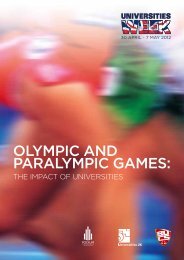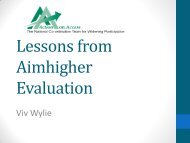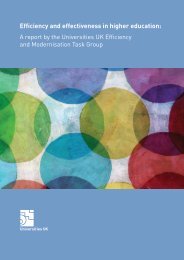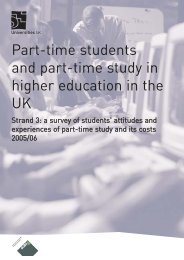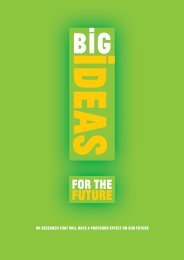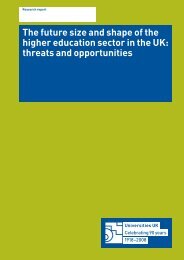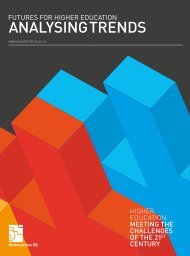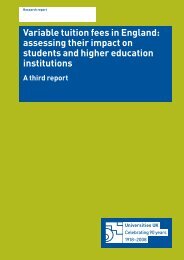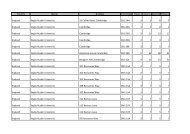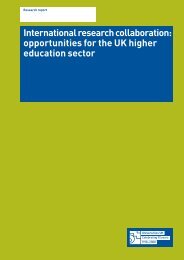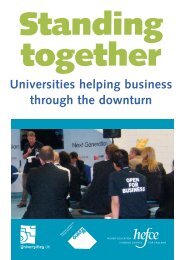The future of research - Universities UK
The future of research - Universities UK
The future of research - Universities UK
You also want an ePaper? Increase the reach of your titles
YUMPU automatically turns print PDFs into web optimized ePapers that Google loves.
<strong>Universities</strong> <strong>UK</strong> – <strong>The</strong> <strong>future</strong> <strong>of</strong> <strong>research</strong><br />
17<br />
It is not an original suggestion that the boundary between academic <strong>research</strong><br />
and wider knowledge development in the public and private sectors, could<br />
usefully be made more permeable. As noted earlier in this document, it would<br />
be extremely valuable if more people in knowledge-based careers could spend<br />
some time back in a university as part <strong>of</strong> their career development, so as to help<br />
build understanding, mentor developing <strong>research</strong>ers and reduce the cultural<br />
barriers. An ambition <strong>of</strong> the Science & Innovation Investment Framework is for<br />
the <strong>UK</strong> to achieve ‘increased business investment in R&D, and increased business<br />
engagement in drawing on the <strong>UK</strong> science base for ideas and talent’. People<br />
who come from, or move between, universities and other parts <strong>of</strong> the economy,<br />
can have a role in developing this productive relationship between <strong>research</strong><br />
users and universities.<br />
Too <strong>of</strong>ten university <strong>research</strong> has been conjured by policymakers<br />
as producing answers to the ‘wrong’ questions, while <strong>research</strong>-users<br />
have been unable to state clearly what they need from <strong>research</strong>. Articulating<br />
the problem is as difficult as finding answers: another reason to encourage the<br />
‘best and most committed’ to move, and to move in both directions. An example<br />
which tests this analysis is medicine. Health pr<strong>of</strong>essionals expend considerable<br />
resource on interpreting medical <strong>research</strong> so that it can be used across the<br />
health community. <strong>The</strong> ‘mobile people’ analysis holds good here, as clinician<strong>research</strong>ers<br />
straddle the <strong>research</strong>/user boundary.<br />
It is challenging for those moving between ladders to<br />
progress up them. Mobility between sectors and countries must nonetheless be<br />
encouraged. Early career stage <strong>research</strong>ers move between HEIs, and frequently<br />
to a non-university <strong>research</strong> environment. <strong>Universities</strong> should seek new ways<br />
to remain engaged with these bright people as their careers develop, through<br />
<strong>research</strong> collaborations outside the sector and by bringing people back, for<br />
example as mentors for the next generation <strong>of</strong> <strong>research</strong>ers. <strong>Universities</strong> also<br />
need a <strong>research</strong> workforce with an international perspective, as we noted above.<br />
This mobile, flexible workforce will come at a cost, but that may be the most<br />
important and beneficial part <strong>of</strong> what universities can <strong>of</strong>fer to the economy if<br />
investment can be sustained.<br />
Recommendations<br />
Rec 12 <strong>Universities</strong> should continue the development <strong>of</strong> talent with which they<br />
have engaged much more effectively in recent years and promote a strong<br />
mentoring culture.<br />
Rec 13 <strong>Universities</strong> should provide more effective and balanced careers advice to<br />
all those involved in <strong>research</strong>. <strong>The</strong>y should ensure that all individuals, <strong>of</strong> whatever<br />
talent, recognise the diversity <strong>of</strong> relevant career opportunities, the possibility <strong>of</strong><br />
having impact in a knowledge-based career in the economy and society, and the<br />
mutual benefit then <strong>of</strong> remaining engaged with academia throughout that career.<br />
Rec 14 <strong>Universities</strong> should seek to make use <strong>of</strong> their relationships with alumni<br />
to acquire better links with organisations and companies that use <strong>research</strong>.<br />
This will not only help to build <strong>research</strong> capacity in those organisations but also<br />
build knowledge <strong>of</strong> the <strong>research</strong> users needs within the <strong>research</strong> base. Alumni<br />
relationships could provide additional mentoring links for <strong>research</strong>ers.<br />
Rec 15 <strong>Universities</strong> should enhance their knowledge capital by promoting<br />
mobility and circulation, nationally and internationally, as a key part <strong>of</strong> career<br />
development for their best people. (See also Rec 4).



